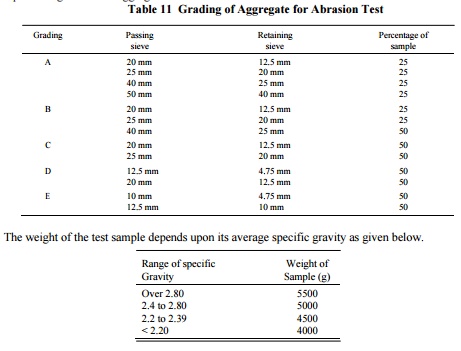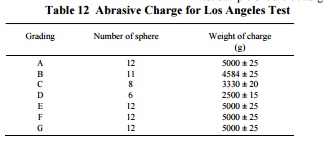Chapter: Civil : Construction Materials: Lime, Cement, Aggregates, Mortar
Aggregate Abrasion Value Test (IS: 2386 (Part IV))
Aggregate Abrasion Value Test (IS:
2386 (Part IV))
The abrasion value
of coarse aggregate may be determined by either Deval Machine or by Los Angeles
machine.
Using Deval Machine
Abrasive Charge: The abrasive charge consists of
6 cast iron or steel spheres approximately 48 mm in diameter, each weighing
between 390 and 445 g. An abrasive charge of 6 spheres weighing 2500 ± 10 g is
used with each test sample.
The test sample
consists of dry coarse aggregate made up of percentages of the various sizes
conforming to one of the gradings shown in Table 6.7. The grading used should
be that most nearly representing the coarse aggregate furnished for the work.

Procedure: The test sample and
the abrasive charge are placed in the Deval abrasion testing machine and the
machine is rotated for 10000 revolutions at a speed of 30 to 33 rev/min. At the
completion of the test, the material is removed from machine and sieved on a
1.70 mm sieve. The material retained on the sieve is washed, dried and
accurately weighed to the nearest gram.
The loss by abrasion is
considered as the difference between the original weight of the sample and the
weight of the material retained on the 1.70 mm sieve, expressed as percentage
of the original weight of the test sample.
In case of crushed gravel, the
percentage by weight of crushed fragments is determined, and the permissible
percentage or wear is calculated as:
W = AL (100
A)L / 100
Where W =
permissible percentage of wear
A = percentage of
uncrushed fragments
L= maximum percentage of wear
permitted by the specifications for gravel consisting entirely of uncrushed
fragments
100 - A = percentage of crushed
fragments
L = maximum
percentage of wear permitted by the specifications for gravel consisting
entirely of crushed fragments
Using Los Angeles Machine
Abrasive Charge: The abrasive
charge consists of cast iron spheres or steel spheres approximately 48 mm in
diameter and each weighing between 390 and 445 g.
The
abrasive charge, depending upon the grading of the test sample should be as
given in Table 12.

The test sample consists of clean
aggregate dried in an oven at 105 -110 o C to substantially constant weight.
Note: It is recognized that
different specification limits may be required for gradings E, F and G than for
A, B, C and D. It is urged that investigations be conducted to determine the
relationship, if any, which exists between results for these coarse gradings
using the 10000 g samples and the finer ones using the 5000 g samples.
The test sample and the abrasive
charge is placed in the Los Angeles abrasion testing machine and the machine is
rotated at a speed of 20 to 33 rev/min. For gradings A, B, C and D, the machine
is rotated for 500 revolutions; for gradings E, F and G, it is rotated for 1000
revolutions. The machine is so driven and so counter-balanced as to maintain a
substantially uniform peripheral speed. If an angle is used as the shelf, the
machine is rotated in such a direction that the charge is caught on the outside
surface of the angle. At the completion of the test, the material is discharged
from the machine and a preliminary separation of the sample made on a sieve
coarser than the 1.70 mm. The finer portion is then sieved on a 1.70 mm
sieve.The material coarser than the 1.70 mm sieve is washed, dried in an oven
at 105 -110 o C to a substantially constant weight, and accurately weighed to the
nearest gram. The difference between the original and the final weights of the
test sample expressed as a percentage of the original weight of the test sample
gives the percentage of wear.
Related Topics